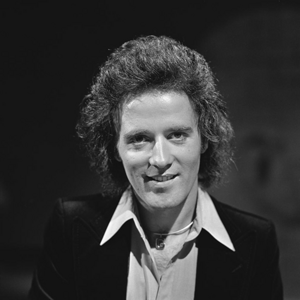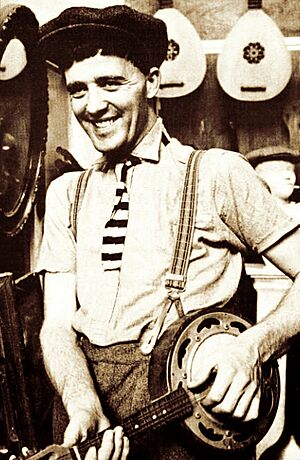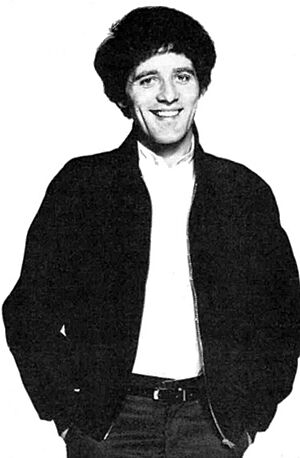Gilbert O'Sullivan facts for kids
Quick facts for kids
Gilbert O'Sullivan
|
|
|---|---|

O'Sullivan on TopPop in 1974
|
|
| Background information | |
| Birth name | Raymond Edward O'Sullivan |
| Born | 1 December 1946 Waterford, Ireland |
| Genres | |
| Occupation(s) | Singer-songwriter |
| Instruments |
|
| Years active | 1967–present |
| Labels | Current Union Square (2007–2010; 2013–present) Former MAM (1967–1978) CBS (1978–1986) Ultraphone (1986–1988) Dover (1989–1990) Park Records (1991–2000) EMI (2000–2007) Victor (2007) Hypertension (2011–2013) |
Raymond Edward O'Sullivan (born 1 December 1946), known as Gilbert O'Sullivan, is an Irish singer and songwriter. He became very famous in the early 1970s with popular songs like "Alone Again (Naturally)", "Clair", and "Get Down". His music often features his special way of playing the piano and clever lyrics that use wordplay.
Gilbert O'Sullivan was born in Waterford, Ireland. When he was a child, his family moved to Swindon, England. He started his music career in 1967. Around the world, he has had 16 songs reach the top 40, including six number-one hits. His first number-one song was "Nothing Rhymed" in 1970. He has released 19 studio albums during his career. In 1972, Record Mirror magazine named him the top male singer in the UK. He has also won three Ivor Novello Awards, including "Songwriter of the Year" in 1973.
Contents
Early Life and Music Beginnings
Gilbert O'Sullivan was born on 1 December 1946 in Waterford, Ireland. He was one of six children. His mother ran a sweet shop, and his father was a butcher. When Gilbert was seven, his family moved to Battersea, London, and then a year later to Swindon, Wiltshire, England.
It was in Swindon that he started playing the piano. He once said that his parents believed if one of their children could play, they could earn money from it. He took piano lessons for a short time but preferred to play by ear, meaning he could play songs just by listening to them. His father passed away two years after they moved to Swindon.
School and Early Bands
O'Sullivan went to St Joseph's Catholic College and then Swindon College. At college, he studied graphic design. He also played in several bands that were not yet professional, like the Doodles and the Prefects. He was mostly a drummer in a band called Rick's Blues. The band's founder, Rick Davies, who later started the famous band Supertramp, taught Gilbert how to play both drums and piano.
Gilbert's drumming skills influenced his unique piano style. He often plays the piano in a way that sounds like drums, using his left hand for a "high hat" sound and his right hand for a "snare" sound. He began writing his own songs, inspired by bands like the Beatles and singers like Bob Dylan.
Music Career Journey
In 1967, O'Sullivan moved to London to become a professional musician. He wanted to stand out, so he created a very noticeable look. He had a bowl cut haircut, wore a cloth cap, and short trousers. He said this look was inspired by his love for silent film stars like Buster Keaton and Charlie Chaplin.
He got a five-year contract with April Music, a publishing company for CBS Records. A manager there, Stephen Shane, suggested he change his name from Ray to Gilbert, as a fun reference to the famous opera writers Gilbert and Sullivan. He received an advance payment of £12, which he used to buy a piano.
First Steps and Big Break
His first two songs, "Disappear" (1967) and "What Can I Do" (1968), did not become hits. He then signed with a new record label, MAM Records, managed by Gordon Mills. Mills managed famous singers like Tom Jones. At first, Mills didn't like Gilbert's unique look, but Gilbert insisted on keeping it. This look made him very recognizable.
At the end of 1970, Gilbert O'Sullivan had his first big hit in the UK with "Nothing Rhymed". This song also reached number one in the Netherlands. In 1971, he had more hits like "Underneath The Blanket Go" and "We Will". His song "No Matter How I Try" won an award for "Best Ballad or Romantic Song" in 1972.
His first album, Himself, came out in August 1971. Critics liked it, comparing his songwriting style to Paul McCartney. Gilbert didn't tour much for this album but appeared on British television.
International Stardom
In 1972, Gilbert O'Sullivan became famous worldwide with "Alone Again (Naturally)". This song is a sad ballad about feelings of loss. It reached number 3 in the UK but was a huge hit in America, staying at number one on the Billboard Hot 100 chart for six weeks. It sold nearly two million copies there. The song was also very popular in Canada, New Zealand, and Japan.
Around this time, Gilbert changed his image. He stopped wearing the cap and short trousers and adopted a more modern, "college-like" look, often wearing a sweater with a big 'G' on it. This was a choice to make sure he was seen as a serious artist.
He followed up "Alone Again (Naturally)" with "Clair", which became a number one hit in the UK, Norway, France, Belgium, Ireland, and Canada. His second album, Back to Front, also had a hit song called "Out of the Question".
In 1972, Gilbert O'Sullivan sold over 10 million records, making him a top star. He was named the number one male singer of 1972 by Record Mirror and won "British Songwriter of the Year" in 1973.
Continued Hits and Challenges
In 1973, Gilbert released his third album, I'm a Writer, Not a Fighter. This album showed more rock and funk influences. The main song from the album, "Get Down", reached number one in the UK, Belgium, and Germany. It was his third song to sell over a million copies.
Gilbert had about five years of great success with MAM Records. He had seven top 10 singles and four top 10 albums in the UK, and many hits in other countries too. However, by 1974, his sales started to slow down. His song "A Woman's Place" caused some discussion because of its lyrics.
In 1977, his fifth album with MAM, Southpaw, did not become a hit. Gilbert then found out that his contract with MAM Records was very unfair to him. He started a lawsuit to get the money he believed he was owed. In 1982, the court decided in his favor, saying he was an "honest and decent man" who had not received his fair share of the money his songs earned. He was awarded £7 million. Even though he won, this legal battle put his music career on hold for a while.
Later Career and Legacy
After a break, Gilbert O'Sullivan returned to CBS Records in 1980. His song "What's in a Kiss?" reached number 19 in the UK. He released more albums, Off Centre (1980) and Life & Rhymes (1982).
Gilbert O'Sullivan is also known for a very important court case in 1991. He sued a rapper named Biz Markie for using a part of his song "Alone Again (Naturally)" without permission. Gilbert won the case, and this decision made it much more common for artists to get permission and pay to use "samples" (small parts) of other people's songs in their own music.
Gilbert O'Sullivan has continued to record and perform music in the 21st century. He is especially popular in Japan. He released albums like A Scruff at Heart (2007) and Gilbertville (2011). In 2008, he performed at the Glastonbury Festival.
In March 2012, a collection of his best songs, Gilbert O'Sullivan: The Very Best Of – A Singer & His Songs, reached number 12 on the UK Albums Chart. He released Latin à la G! in 2015. His 19th studio album, Gilbert O'Sullivan, came out in 2018 and reached number 20 in the UK, his first charting studio album in over 40 years.
His 20th studio album, Driven, was released in July 2022 and reached number 26 in the UK. In March 2024, the city of Waterford in Ireland gave Gilbert O'Sullivan the "Freedom of the City & County" award, which is a special honour.
Personal Life
Gilbert O'Sullivan chose not to date much when he was at the peak of his career. He worried it would stop him from writing songs. In January 1980, he married his Norwegian girlfriend, Aase Brekke. They have two daughters, Helen-Marie and Tara.
He currently lives in Jersey, an island between England and France.
Album Discography
- Himself (1971)
- Back To Front (1972)
- I'm a Writer, Not a Fighter (1973)
- A Stranger in My Own Back Yard (1974)
- Southpaw (1977)
- Off Centre (1980)
- Life & Rhymes (1982)
- In the Key of G (1989)
- Sounds of the Loop (1991)
- By Larry (1994)
- Every Song Has Its Play (1995)
- Singer Sowing Machine (1997)
- Irlish (2001)
- Piano Foreplay (2003)
- A Scruff At Heart (2007)
- Gilbertville (2011)
- Latin à la G! (2015)
- Gilbert O'Sullivan (2018)
- Driven (2022)
- Songbook (2024)
See also
- List of Irish musicians
- List of artists who reached number one on the UK singles chart
- List of artists who reached number one in the United States
- List of artists who reached number one on the U.S. Adult Contemporary chart
- List of performers on Top of the Pops
 | Bayard Rustin |
 | Jeannette Carter |
 | Jeremiah A. Brown |



